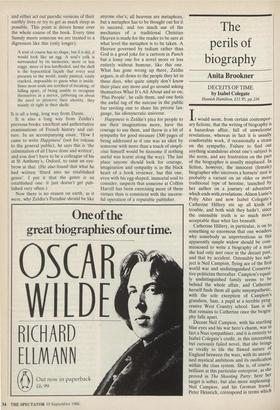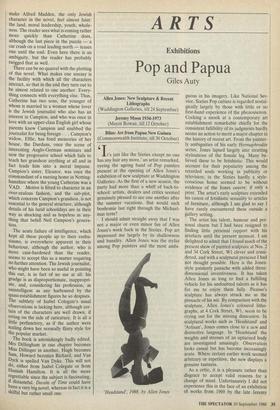The perils of biography
Anita Brookner
DECEITS OF TIME by Isabel Colegate Hamish Hamilton, £11.95, pp.216
It would seem, from certain contempor- ary fictions, that the writing of biography is a hazardous affair, full of unwelcome revelations, whereas in fact it is usually comfortable work, if occasionally a strain on the sympathy. Failure to find out anything scandalous about one's subject is the norm, and any frustration on the part of the biographer is usually misplaced. In fiction, however, the innocent (female) biographer who uncovers a hornets' nest is probably a variant on an older or more traditional type of heroine, launched by her author on a journey of adventure which ends with.revelations. Alison Lurie's Polly Alter and now Isabel Colegate's Catherine Hillery stir up all kinds of trouble, and both wish they hadn't, since the ostensible truth is so much more acceptable than what lies beneath.
Catherine Hillery, in particular, is on to something so enormous that one wonders why somebody as unpretentious as this apparently simple widow should be com- missioned to write a biography of a man she had only met once in the distant past, and that by accident. Ostensibly her sub- ject is Neil Campion, flying ace of the first world war and undistinguished Conserva- tive politician thereafter. Campion's equal- ly undistinguished family seems to be behind the whole affair, and Catherine herself finds them all quite unsympathetic, with the sole exception of Campion's grandson, Sam, a pupil at a terrible prog- ressive West Country school. Sam is all that remains to Catherine once the biogra- phy falls apart. Decent Neil Campion, with his startling blue eyes and his war hero's charm, was in fact a Nazi sympathiser, and it is entirely to Isabel Colegate's credit, in this interesting but curiously failed novel, that she brings so vividly to life the flawed nature of England between the wars, with its unreal- ised mystical ambitions and its ossification within the class system. She is, of course, brilliant at this particular enterprise, as she proved in The Shooting Party: here her target is softer, but also more unpleasing. Neil Campion, and his German friend, Peter Heinrich, correspond in terms which make Alfred Madden, the only Jewish character in the novel, feel almost faint: the land, moral leadership, youth, whole- ness. The reader sees what is coming rather More quickly than Catherine does, although the last piece in the puzzle — a car crash on a road leading north — teases one until the end. Even here there is an ambiguity, but the reader has probably twigged that as well.
There can be no quarrel with the plotting of this novel. What makes one uneasy is the facility with which all the characters interact, so that in the end they turn out to be almost related to one another. Every- thing connects with everything else. Thus, Catherine has two sons, the younger of whom is married to a woman whose lover is the Jewish journalist who also has an interest in Campion, and who was once in love with an upper-class English girl whose parents knew Campion and snubbed the journalist for being foreign . . . Campion's widow, Effie, has fond memories of her house, the Durdans, once the scene of interesting Anglo-German seminars and now the progressive school which fails to teach her grandson anything at all and in fact leads him into a moral impasse. Campion's sister, Eleanor, was once the commandant of a nursing home in Notting- hamshire where the young Catherine was a VAD. Motive is fitted to character in an over-zealous fashion, and the sub-plot, which concerns Campion's grandson, is not essential to the general structure, although details of his lurid schooldays are in their way as shocking and as hopeless as any- thing that befell Neil Campion's genera- tion.
The acute failure of intelligence, which kept all these people up to their enthu- siasms, is everywhere apparent in their behaviour, although the author, who is more case-hardened than the reader, seems to accept this as a matter requiring no further attention. The Jewish journalist, who might have been so useful in pointing this out, is in fact of no use at all: his grudge is as disproportionate, inappropri- ate, and, considering his profession, as unintelligent as any harboured by the quasi-establishment figures he so despises. The subtlety of Isabel Colegate's usual observations is lacking here, although cer- tain of the characters are well drawn, if erring on the side of caricature. It is all a little perfunctory, as if the author were scaling down her normally flinty style for the popular market.
The book is astonishingly badly edited. Mrs Dillingham in one chapter becomes Miss Dillinger in another, Hugh becomes Sam, Howard becomes Richard, and Van Dyck is spelled Van Dyke. This will not do, either from Isabel Colegate or from Hamish Hamilton. It is all the more regrettable since the subject is fascinating, if distasteful. Deceits of Time could have been a very big novel, whereas in fact it is a skilful but rather small one.























































 Previous page
Previous page